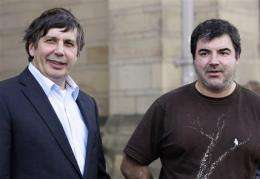This is a Tuesday, Oct. 5, 2010 file photo of Professor Andre Geim, left, and Dr Konstantin Novoselov are seen outside Manchester University, Manchester, England. The scientists won the 2010 Nobel Prize for Physics. (AP Photo/Jon Super, File)
Three physicists whose research on entangled particles plays a key role in attempts to develop super-fast quantum computers could be in the running for the 2011 Nobel Prize in physics on Tuesday.
Although the award committee doesn't give any clues about candidates for the 10 million kronor ($1.5 million) award, Alain Aspect of France, John Clauser of the United States and Anton Zeilinger of Austria are the hottest names in the speculation this year.
For example, the trio is the top bet of leading Nobel-guesser Karin Bojs, the science editor of the Swedish newspaper Dagens Nyheter.
The physicists' work on entangled quantum states shows that particles can be connected even across long distances so that a change in one of them impacts the other. Scientists believe that can be used in the development of quantum computers, many times faster than the computers used today.
Last year, Aspect, Clauser and Zeilinger won the Wolf Prize in Israel, which sometimes is a precursor to the Nobel.
Other contenders could include Israel's Yakir Aharonov and Britain's Michael Berry for work on the Aharonov-Bohm Effect and the related Berry Phase, also within quantum physics.
Developed by Aharonov and the late David Bohm in 1959, the theory explains the actions of parts of atoms around a magnetic field, allowing an electron effectively to split around the magnetic field and rejoin later.
The physics prize is the second Nobel Prize to be announced this year.
The medicine prize, announced Monday, went to American Bruce Beutler and French scientist Jules Hoffmann who shared it with Canadian-born Ralph Steinman for their discoveries about the immune system. Their research has opened up new avenues for the treatment and prevention of infectious illnesses and cancer.
Steinman died of pancreatic cancer three days before the announcement. The Nobel committee said it was unaware that then cell biologist had already died when it awarded the prize to him. The committee is only supposed to consider living scientists, but after an emergency meeting Monday, the Nobel Foundation said the decision on the prize to Steinman will remain unchanged.
The prestigious Nobel Prizes were established in the will of Swedish industrialist Alfred Nobel, and have been handed out since 1901.
Last year's physics award went to Russian-born scientists Andre Geim and Konstantin Novoselov for groundbreaking experiments with graphene, the strongest and thinnest material known to mankind.
The prizes are handed out every year on Dec. 10, on the anniversary of Nobel's death in 1896.
©2011 The Associated Press. All rights reserved. This material may not be published, broadcast, rewritten or redistributed.




















